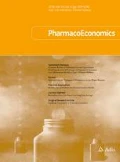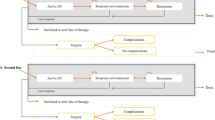Abstract
Objectives: To compare the cost effectiveness of azathioprine (AZA), methotrexate (MTX) and no immunosuppression for maintaining remission of moderate to severe inflammatory bowel disease (IBD) in New Zealand Caucasians, and to determine whether prospective testing for poor metabolisers of AZA by genotype or phenotype is cost effective.
Methods: Pharmacoeconomic models were developed to compare treatment costs and effects (QALYs) in theoretical populations of 1000 IBD patients over a 1-year period. Efficacy and tolerability profiles for AZA and MTX were taken from the literature. The costs (year 2004 values) of the drugs and treatment of adverse effects were estimated from New Zealand drug and service costs. Representations of the patients’ health-related quality of life (HR-QOL) were obtained from clinicians via the EQ-5D health state classification system and valued using the New Zealand EQ-5D social tariff. The effects of genotyping or phenotyping a population for thiopurine methyltransferase (TPMT) status were compared using the prevalence of TPMT deficiency in Caucasians, the relative risks of neutropenia and the associated costs.
Results: Net cost savings (vs no immunosuppressant treatment) of approximately $NZ2.5 million and $NZ1 million were realised for AZA and MTX, respectively, for the theoretical 1000 patients, and AZA generated 877 QALYs compared with 633 for MTX. Phenotype and genotype testing generated net cost savings (vs no testing) of $NZ120 000 and $NZ11 000, respectively. Savings related to phenotype tests were greater because of the lower assay costs of phenotype testing and a greater likelihood of pre-empting neutropenia.
Conclusion: Our model suggests that both MTX and AZA may generate significant net cost savings and benefits for patients with IBD in New Zealand, with AZA likely to be more cost effective than MTX. Prospective testing for poor metabolisers of AZA may also be cost effective, with phenotype testing likely to be more cost effective than genotype testing.











Similar content being viewed by others
References
Janowitz HD. Inflammatory bowel disease: a clinical approach. New York: Oxford University Press, 1994: 8–158
Knigge KL. Inflammatory bowel disease. Clin Cornerstone 2002; 4 (4): 49–60
Rampton DS, Shanahan F. Inflammatory bowel disease. Oxford: Health Press, 2000
Silverstein MD, Loftus EV, Sandborn WJ, et al. Clinical course and costs of care for Crohn’s Disease: Markov model analysis of a population-based cohort. Gastroenterology 1999; 117: 49–57
Card T, Hubbard R, Logan RFA. Mortality in inflammatory bowel disease: a population based cohort study. Gastroenterology 2003; 125: 1583–90
Arndt C, Balis F, McCully L. Bioavailability of low-dose verses lowdose 6-mercaptopurine. Clin Pharmacol Ther 1988; 45 (5): 588–91
Van Os E, Zins BJ, Sandborn WJ, et al. Azathioprine pharmacokinetics after intravenous, oral, delayed release oral and rectal foam administration. Gut 1996; 39 (1): 63–8
Feagan BG, Alfadhli A. Methotrexate in inflammatory bowel disease. Gastroenterol Clin North Am 2004; 33: 407–20
Pearson DC, May GR, Fick G, et al. Azathioprine for maintenance of remission in Crohn’s disease. Available in The Cochrane Library [database on disk and CD-ROM]. Updated quaterly. The Cochrane Collaboration; issue 2. Oxford: Update Software, 2004
Markowitz JF. Therapeutic efficacy and safety of 6-mercaptopurine and azathioprine in patients with Crohn’s Disease. Rev Gastroenterol Disord 2003; 3 Suppl. 1: S23–9
Gearry RB, Barclay M, Burt MJ, et al. Thiopurine drug adverse effects in a population of New Zealand patients with inflammatory bowel disease. Pharmacoepidemiol Drug Saf 2004; 13: 563–7
Fraser AG, Morton D, McGovern D, et al. The efficacy of methotrexate for maintaining remission in inflammatory bowel disease. Aliment Phannacol Ther 2002; 16: 693–7
Umann M, Chamoit-Prieur C, Mesnard B. Methotrexate for the treatment of refractory Crohn’s disease. Aliment Pharmacol Ther 1996; 10: 309–14
Lemann M, Zenjari T, Bouhnik Y, et al. Methotrexate in Crohn’s disease: long-term efficacy and toxicity. Am J Gastroenterol 2000; 95 (7): 1730–4
Schnabel A, Gross WL. Low dose methotrexate in rheumatic diseases: efficacy, side effects, and risk factors for side effects. Semin Arthritis Rheum 1994; 23: 310–27
Dubinsky M, Reyeas E, Of man J, et al. A cost-effectiveness analysis of alternative disease management strategies in patients treated with azathioprine or 6-mercaptopurine. Am J Gastroenterol 2005; 100: 2239–47
Gardiner SJ, Begg EJ, Barclay ML, et al. Genetic polymorphism and outcomes with azathioprine and 6-mercaptopurine. Adverse Drug React Toxicol Rev 2000; 19 (4): 293–312
Schaeffeler E, Fischer C, Brockmeier D, et al. Comprehensive analysis of thiopurine S-methyltransferase phenotype-genotype correlation in a larger population of German-Caucasians and identification of novel TPMT variants. Pharmacogenetics 2004; 14 (7): 407–17
Gardiner SJ, Begg EJ. Pharmacogenetic testing for drug metabolizing enzymes: is it happening in practice? Pharmacogenet Genomics 2005; 15: 365–9
Sies C, Florkowski C, George P, et al. Measurement of thiopurine methyl-transferase activity guides dose initiation and prevents toxicity from azathioprine. N Z Med J 2005; 118 (1210), 1–7
Weinshilboum RM. Human pharmacogenetics of methyl conjugation. Fed Proc 1984; 43 (8): 2303–7
Gardiner SJ, Gearry RB, Barclay ML, et al. Two cases of thiopurine methyltransferase (TPMT) deficiency: a lucky save and a near miss with azathioprine. Br J Clin Pharmacol. Epub 2005 Aug 1
Winter J, Walker A, Shapiro D, et al. Cost-effectiveness of thiopurine methyltransferase genotype screening in patients about to commence azathioprine therapy for the treatment of inflammatory bowel disease. Aliment Pharmacol Ther 2004; 20: 593–9
Bouhnik Y, Lemann M, Mary J-Y, et al. Long-term follow-up of patients with Crohn’s disease treated with azathioprine or 6-mercaptopurine. Lancet 1996; 347: 215–9
Chong RY, Hanauer SB, Cohen RD. Efficacy of paraenteral methotrexate in refractory Crohn’s disease. Aliment Pharmacol Ther 2001; 15: 35–44
Feagan BG, Fedorak RN, Irvine J, et al. A comparison of methotrexate with placebo for the maintenance of remission in Crohn’s Disease. N Engl J Med 2000; 342: 1627–32
Friedman S. General principles of medical therapy of Inflammatory Bowel Disease. Gastroenterol Clin North Am 2004; 33: 191–208
Pearson DC, May GR, Fick G, et al. Azathioprine and 6-mercaptopurine in Crohn’s Disease: a meta analysis. Ann Intern Med 1995; 123 (2): 132–42
Chong RY, Hanauer SB, Cohen RD. Methotrexate in Crohn’s disease: how’s it doing? [abstract]. Gastroenterology 1998; 114: A951
Bloomfield RS, Onken JE. Mercaptopurine metabolite results in clinical gastroenterology practice. Aliment Pharmacol Ther 2003; 17: 69–73
Cunliffe RN, Scott BB. Monitoring for drug side effects in inflammatory bowel disease. Aliment Pharmacol Ther 2002; 16: 647–62
Schroder O, Stein J. Low dose methotrexate in Inflammatory Bowel Disease: current status and future directions. Am J Gastroenterol 2003; 98 (3): 530–7
Lewis JD, Schwartz JS, Lichtenstein GR. Azathioprine for the maintenance of remission of Crohn’s Disease. Gastroenterology 2000; 118: 1018–24
Kanik KS, Cash JM. Does methotrexate increase the risk of infection or malignancy? Rheum Dis Clin North Am 1997; 23: 955–67
Present DH, Meltzer SJ, Krumholz MP, et al. 6-Mercaptopurine in the management of inflammatory bowel disease: short and long-term toxicity. Ann Intern Med 1989; 111 (8): 641–9
Egan LJ, Sandborn WJ. Methotrexate for inflammatory bowel disease: pharmacology and preliminary results. Mayo Clin Proc 1996; 71: 69–80
Weinshilboum RM, Sladek SL. Mercaptopurine pharmacogenetics: monogenic inheritance of erythrocyte thiopurine methyltransferase activity. Am J Hum Genet 1980; 32: 651–2
Pharmaceutical Management Agency. Pharmaceutical Schedule [online]. Available from: http://www.pharmac.govt.nz [Accessed 2004 Jul]
Canterbury Health Laboratories. Canterbury District Health Board. [online]. Available from: http://www.cdhb.govt.nz [Accessed 2004 Jul]
Roberts RL, Barclay ML, Gearry RB, et al. A multiplexed allele-specific polymerase chain reaction assay for the detection of common thiopurine S-methyltransferase (TPMT) mutations. Clin Chim Acta 2004; 341: 49–53
Walmsley TA, Florkowski CM, George PM, et al. Thiopurine methyltransferase: radiochemical microassay and biochemical properties. N Z Med J 2002; 115: 302
Weinshilboum RM, Raymond FA, Pazmino PA. Human erythrocyte thiopurine methyl transferase: radiochemical microassay and biochemical properties. Clin Chim Acta 1978; 85: 323–33
Devlin NJ, Hansen P, Kind P, et al. The health state preferences and local inconsistencies of New Zealanders: a tale of two tariffs. The University of York, Centre for Health Economics. University of Otago. 2000, Discussion Paper 180
Weinstein MC, Siegel JE, Gold MR, et al. Recommendation of the panel on cost-effectiveness in health and medicine. JAMA 1996; 276: 1253–8
Devlin NJ, Hansen P, Kind P, et al. Logical inconsistencies in survey respondents’ health state valuations: a methodological challenge for estimating social tariffs. Health Econ 2003; 12 (7) 529–44
EQ-5D [online]. Available from URL: http://www.euroqol.org [Accessed 2006 Jun 22]
Jowett SL, Seal CJ, Barton JR, et al. The short Inflammatory Bowel Disease questionnaire is reliable and responsive to clinically important change in ulcerative colitis. Am J Gastroenterol 2001; 96: 2921–8
Oh K-T, Anis AH, Bae S-C. Pharmacoeconomic analysis of thiopurine methyltransferase polymorphism screening by polymerase chain reaction for treatment with azathioprine in Korea. Rheumatology 2004; 43: 156–63
Marra CA, Esdaile JM, Anis AH. Practical pharmacogenetics: the cost-effectiveness of screening for thiopurine S-methyltransferase polymorphisms in patients with rheumatological conditions treated with azathioprine. J Rheumatol 2002; 29: 2507–12
Suarez-Alamazor ME, Spooner C, Belseck E. Azathioprine for treating rheumatoid arthritis. Available in The Cochrane Library [database on disk and CD-ROM]. Updated quaterly. The Cochrane Collaboration; issue 4. Oxford: Update Software, 2004
Krynetski EY, Evans WE. Genetic polymorphism of thiopurine S-methyltransferase: molecular rnxhanisms and clinical importance. Pharmacology 2000; 61: 136–46
Cheung ST, Allan RN. Mistaken identity: misclassification of TPMT phenotype following blood transfusion. Eur J Gastroenterol Hepatol 2003; 15 (11): 1245–7
Schwab M, Schaeffeler E, Marx C, et al. Shortcoming in the diagnosis of TPMT deficiency in a patient with Crohn’s Disease using phenotyping only. Gastroenterology 2001; 121: 500–1
Pazmino PA, Sladek SL, Weinshilboum RM. Thiol S-methylation in uremia: erythrocyte enzyme activities and plasma inhibitors. Clin Pharmacol Ther 1980; 28: 356–67
Author information
Authors and Affiliations
Rights and permissions
About this article
Cite this article
Priest, V.L., Begg, E.J., Gardiner, S.J. et al. Pharmacoeconomic Analyses of Azathioprine, Methotrexate and Prospective Pharmacogenetic Testing for the Management of Inflammatory Bowel Disease. Pharmacoeconomics 24, 767–781 (2006). https://doi.org/10.2165/00019053-200624080-00004
Published:
Issue Date:
DOI: https://doi.org/10.2165/00019053-200624080-00004




